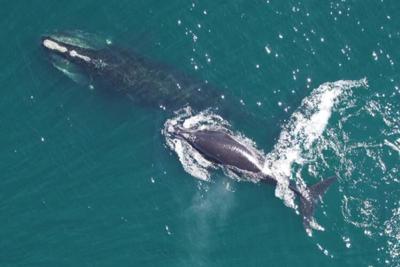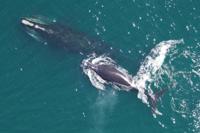DELMARVA - The Biden Administration has withdrawn a proposed rule that would have required more ships to slow down off the Atlantic coast and expanded slow zones in order to protect the endangered North Atlantic right whale.
First introduced in 2022, the North Atlantic Right Whale Vessel Strike Reduction Rule included changes such as a mandatory 10-knot speed restriction to vessels 35 feet or longer in slow zones and an expansion of the Seasonal Speed Zones from Massachusetts to Florida.
The proposal was hailed by environmentalists as a necessary move to protect the vanishing right whale, including here off the coast of Delmarva, which are prone to injury and death from vessel strikes. Experts estimate less than 380 North Atlantic right whales survive in the wild today.
Critics of the proposal cited the possible negative impacts to both professional and recreational boaters, as well as coastal economies. Officials posted the proposed changes on the Federal Register and opened the issue up to public comment. As of January 2025, over 90,000 comments were submitted.
As the Biden administration comes to an end, however, officials with the National Marine Fisheries Service (NMFS) and the National Oceanic and Atmospheric Administration (NOAA) say they do not have enough time to proceed with implementing the new regulations due to the overwhelming number of public comments.
The National Marine Fisheries Service confirmed they had withdrawn the proposed rule on Wednesday, January 15.
According to conservationist group Oceana campaign director Gib Brogan, the incoming Trump administration will be less likely to pursue further restrictions on shipping. The Trump campaign has signalled a shift from environmental conservation in favor of supporting marine industries, according to conservationist groups.
"While we've been waiting and watching the proposed rule move forward, and ultimately stall, we've watched on the water outcomes of the current insufficient protections," Brogan said. "And we've watched whales be killed by speeding boats."
Others in the shipping industry praised the withdrawal of the proposals.
"This is a huge step forward for American boat manufacturers, coastal economies, and outdoor enthusiasts across the U.S.," said Frank Hugelmeyer, president and CEO of the National Marine Manufacturers Association. "The way this rule was drafted gave rulemaking a bad name and created an entirely preventable dynamic."
Over on Delmarva, WBOC spoke with locals to get their reaction.
Commercial watermen Sonny Gwin says the proposal would kill business for recreational and commercial fishermen. "The recreational end, yeah it would kill them. It would kill their business. Because they got to get to where they need to go. Sometimes 60-80 miles to their fishing grounds," says Sonny Gwin. He suggested using technology to track the whales. Saying it would be a win for both parties. "Technology is getting better and better all the time. They're tracking these whales like we've never tracked them before. We're hoping that they can track them enough that they can let us know where they are at and we can stay away from them," says Gwin.
Suzanne Thurman the executive director of the Merr Institute says the proposal would save whales. "By having ships reduce their speeds during certain seasons when whales are moving between areas, that would be a primary time to have those speed restrictions in place and that just enables the whale to know that the ship is coming," says Thurman.
She says the withdraw was disappointing. "It's devastating news of course because we know how perilous the current population is of the North Atlantic right whale," says Thurman.


